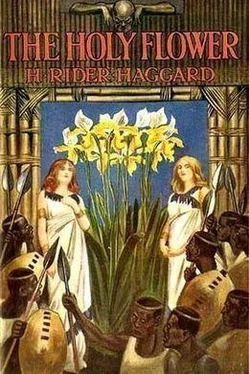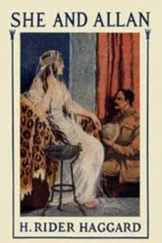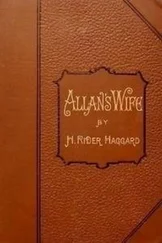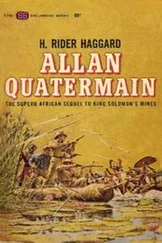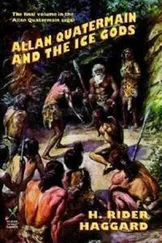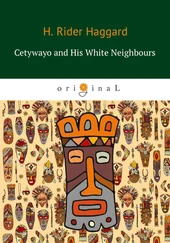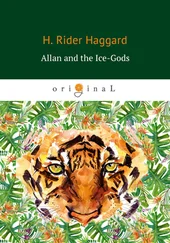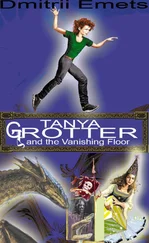Генри Хаггард - Allan and the Holy Flower
Здесь есть возможность читать онлайн «Генри Хаггард - Allan and the Holy Flower» — ознакомительный отрывок электронной книги совершенно бесплатно, а после прочтения отрывка купить полную версию. В некоторых случаях можно слушать аудио, скачать через торрент в формате fb2 и присутствует краткое содержание. Год выпуска: 2014, Издательство: epubBooks Classics, Жанр: Путешествия и география, на английском языке. Описание произведения, (предисловие) а так же отзывы посетителей доступны на портале библиотеки ЛибКат.
- Название:Allan and the Holy Flower
- Автор:
- Издательство:epubBooks Classics
- Жанр:
- Год:2014
- ISBN:нет данных
- Рейтинг книги:5 / 5. Голосов: 1
-
Избранное:Добавить в избранное
- Отзывы:
-
Ваша оценка:
- 100
- 1
- 2
- 3
- 4
- 5
Allan and the Holy Flower: краткое содержание, описание и аннотация
Предлагаем к чтению аннотацию, описание, краткое содержание или предисловие (зависит от того, что написал сам автор книги «Allan and the Holy Flower»). Если вы не нашли необходимую информацию о книге — напишите в комментариях, мы постараемся отыскать её.
Allan and the Holy Flower — читать онлайн ознакомительный отрывок
Ниже представлен текст книги, разбитый по страницам. Система сохранения места последней прочитанной страницы, позволяет с удобством читать онлайн бесплатно книгу «Allan and the Holy Flower», без необходимости каждый раз заново искать на чём Вы остановились. Поставьте закладку, и сможете в любой момент перейти на страницу, на которой закончили чтение.
Интервал:
Закладка:
Making a circuit to avoid observation as before, in a very short time we reached the mouth of the cave. I leant forward and peeped round the western wall of rock. Nobody seemed to be stirring. There the fires burned dimly, there the huddled shape of the Motombo still crouched upon the platform. Silently, silently we disembarked, and I formed our procession while the others looked askance at the horrible face of the dead Motombo.
I headed it, then came the Mother of the Flower, followed by Hans, playing his part of the god of the forest; then Brother John and Stephen carrying the Holy Flower. After it walked Hope, while Mavovo brought up the rear. Near to one of the fires, as I had noted on our first passage of the cave, lay a pile of the torches which I have already mentioned. We lit some of them, and at a sign from me, Mavovo dragged the canoe back into its little dock and tied the cord to its post. Its appearance there, apparently undisturbed, might, I thought, make our crossing of the water seem even more mysterious. All this while I watched the doors in the sides of the cave, expecting every moment to see the women rush out. But none came. Perhaps they slept, or perhaps they were absent; I do not know to this day.
We started, and in solemn silence threaded our way down the windings of the cave, extinguishing our torches as soon as we saw light at its inland outlet. At a few paces from its mouth stood a sentry. His back was towards the cave, and in the uncertain gleams of the moon, struggling with the clouds, for a thin rain still fell, he never noted us till we were right on to him. Then he turned and saw, and at the awful sight of this procession of the gods of his land, threw up his arms, and without a word fell senseless. Although I never asked, I think that Mavovo took measures to prevent his awakening. At any rate when I looked back later on, I observed that he was carrying a big Pongo spear with a long shaft, instead of the copper weapon which he had taken from one of the coffins.
On we marched towards Rica Town, following the easy path by which we had come. As I have said, the country was very deserted and the inhabitants of such huts as we passed were evidently fast asleep. Also there were no dogs in this land to awake them with their barking. Between the cave and Rica we were not, I think, seen by a single soul.
Through that long night we pushed on as fast was we could travel, only stopping now and again for a few minutes to rest the bearers of the Holy Flower. Indeed at times Mrs. Eversley relieved her husband at this task, but Stephen, being very strong, carried his end of the stretcher throughout the whole journey.
Hans, of course, was much oppressed by the great weight of the gorilla skin, which, although it had shrunk a good deal, remained as heavy as ever. But he was a tough old fellow, and on the whole got on better than might have been expected, though by the time we reached the town he was sometimes obliged to follow the example of the god itself and help himself forward with his hands, going on all fours, as a gorilla generally does.
We reached the broad, long street of Rica about half an hour before dawn, and proceeded down it till we were past the Feast–house still quite unobserved, for as yet none were stirring on that wet morning. Indeed it was not until we were within a hundred yards of the harbour that a woman possessed of the virtue, or vice, of early rising, who had come from a hut to work in her garden, saw us and raised an awful, piercing scream.
"The gods!" she screamed. "The gods are leaving the land and taking the white men with them."
Instantly there arose a hubbub in the houses. Heads were thrust out of the doors and people ran into the gardens, every one of whom began to yell till one might have thought that a massacre was in progress. But as yet no one came near us, for they were afraid.
"Push on," I cried, "or all is lost."
They answered nobly. Hans struggled forward on all fours, for he was nearly done and his hideous garment was choking him, while Stephen and Brother John, exhausted though they were with the weight of the great plant, actually broke into a feeble trot. We came to the harbour and there, tied to the wharf, was the same canoe in which we had crossed to Pongo–land. We sprang into it and cut the fastenings with my knife, having no time to untie them, and pushed off from the wharf.
By now hundreds of people, among them many soldiers were hard upon and indeed around us, but still they seemed too frightened to do anything. So far the inspiration of Hans' disguise had saved us. In the midst of them, by the light of the rising sun, I recognised Komba, who ran up, a great spear in his hand, and for a moment halted amazed.
Then it was that the catastrophe happened which nearly cost us all our lives.
Hans, who was in the stern of the canoe, began to faint from exhaustion, and in his efforts to obtain air, for the heat and stench of the skin were overpowering him, thrust his head out through the lacings of the hide beneath the reed–stuffed mask of the gorilla, which fell over languidly upon his shoulder. Komba saw his ugly little face and knew it again.
"It is a trick!" he roared. "These white devils have killed the god and stolen the Holy Flower and its priestess. The yellow man is wrapped in the skin of the god. To the boats! To the boats!"
"Paddle," I shouted to Brother John and Stephen, "paddle for your lives! Mavovo, help me get up the sail."
As it chanced on that stormy morning the wind was blowing strongly towards the mainland.
We laboured at the mast, shipped it and hauled up the mat sail, but slowly for we were awkward at the business. By the time that it began to draw the paddles had propelled us about four hundred yards from the wharf, whence many canoes, with their sails already set, were starting in pursuit. Standing in the prow of the first of these, and roaring curses and vengeance at us, was Komba, the new Kalubi, who shook a great spear above his head.
An idea occurred to me, who knew that unless something were done we must be overtaken and killed by these skilled boatmen. Leaving Mavovo to attend to the sail, I scrambled aft, and thrusting aside the fainting Hans, knelt down in the stern of the canoe. There was still one charge, or rather one cap, left, and I meant to use it. I put up the largest flapsight, lifted the little rifle and covered Komba, aiming at the point of his chin. Intombi was not sighted for or meant to use at this great distance, and only by this means of allowing for the drop of the bullet, could I hope to hit the man in the body.
The sail was drawing well now and steadied the boat, also, being still under the shelter of the land, the water was smooth as that of a pond, so really I had a very good firing platform. Moreover, weary though I was, my vital forces rose to the emergency and I felt myself grow rigid as a statue. Lastly, the light was good, for the sun rose behind me, its level rays shining full on to my mark. I held my breath and touched the trigger. The charge exploded sweetly and almost at the instant; as the smoke drifted to one side, I saw Komba throw up his arms and fall backwards into the canoe. Then, quite a long while afterwards, or so it seemed, the breeze brought the faint sound of the thud of that fateful bullet to our ears.
Though perhaps I ought not to say so, it was really a wonderful shot in all the circumstances, for, as I learned afterwards, the ball struck just where I hoped that it might, in the centre of the breast, piercing the heart. Indeed, taking everything into consideration, I think that those four shots which I fired in Pongo–land are the real record of my career as a marksman. The first at night broke the arm of the gorilla god and would have killed him had not the charge hung fire and given him time to protect his head. The second did kill him in the midst of a great scrimmage when everything was moving. The third, fired by the glare of lightning after a long swim, slew the Motombo, and the fourth, loosed at this great distance from a moving boat, was the bane of that cold–blooded and treacherous man, Komba, who thought that he had trapped us to Pongo–land to be murdered and eaten as a sacrifice. Lastly there was always the consciousness that no mistake must be made, since with but four percussion caps it could not be retrieved.
Читать дальшеИнтервал:
Закладка:
Похожие книги на «Allan and the Holy Flower»
Представляем Вашему вниманию похожие книги на «Allan and the Holy Flower» списком для выбора. Мы отобрали схожую по названию и смыслу литературу в надежде предоставить читателям больше вариантов отыскать новые, интересные, ещё непрочитанные произведения.
Обсуждение, отзывы о книге «Allan and the Holy Flower» и просто собственные мнения читателей. Оставьте ваши комментарии, напишите, что Вы думаете о произведении, его смысле или главных героях. Укажите что конкретно понравилось, а что нет, и почему Вы так считаете.
